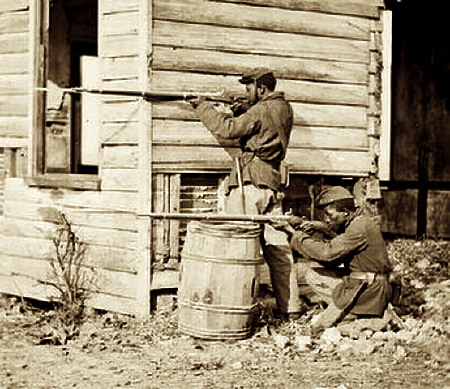In The Political Worlds of Slavery and Freedom, Stephen Hahn makes the case for insurrection – if not a rethinking of rebellion – among Southern slaves during the American Civil War. The title of chapter two places this claim within the context of American history on the subject: “Did We Miss the Greatest Slave Rebellion in Modern History?” Hahn’s casually inclusive “we” invokes the primarily white American scholars who have sculpted something of a glorious history of the Civil War as America’s struggle against slavery. In this narrative – somewhat whitewashed – the Union North took up arms against the slave-owning Confederacy South, if not at first over slavery, then at least by the end of the war broadly claiming emancipation as its raison d’être.
As Hahn is at delicate pains to point out, what this narrative presupposes is the passivity of the slave class (58; 160-161). Slaves have little or no agency in regards to their emancipation. While Northern African-Americans as well as freed southern slaves fought in the Civil War, southern slave plantations did not rise up against their white masters en masse. Why was this? Of course, Confederate mythology, exemplified in films such as D.W. Griffith’s Birth of a Nation, depicts a rose-tinted relationship between benevolent white masters and singin’ & dancin’ black slaves, both who view the Civil War as an invasion. Even among centrist, Abolitionist or integrationist accounts of the War, slaves were often praised for not rising up against the South. In their passivity, the Southern slaves demonstrated civility in this “white man’s war” — a war which was nothing less than a struggle over the fate of black labour.
Hahn poses an alternative reading to the simplism in which passivity marked black patriotism. By contrast, Southern slaves were knowledgeable enough of the conditions of the War, as well as the tricky political terrain in which the War was fought – in short, aware of the ideological role of emancipation, and suspicious of the North’s apparent “freedom” – to carefully navigate between full-scale rebellion and widespread insurrection:
Together, the evidence suggests that slaves could be acutely aware of conflicts that erupted between white people and nations ruled by white people; that slaves often imagined a set of possible allies and enemies; that slaves could be cognizant of the national and international struggle over slavery and the slave trade and, depending on where they resided, of momentous emancipations; that slaves often became conversant with institutions and issues of local and national politics and might develop sophisticated understandings of how the American political system operated; and that slaves fashioned interpretations of what seemed to be afoot, at times in ways that moved well beyond the intentions of the political actors. (Political Worlds 75)






 RT
RT 